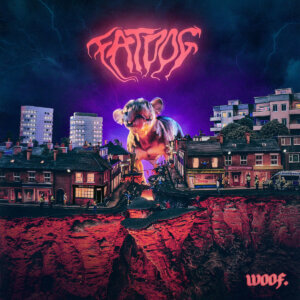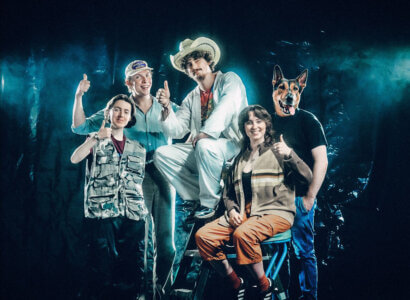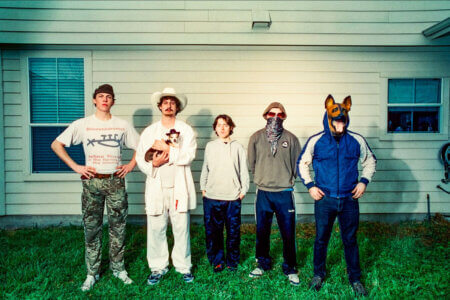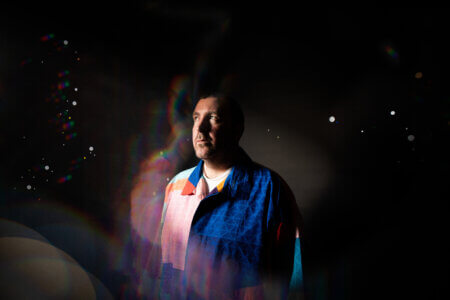Interview with Mish Way from White Lung

The first time I called White Lung’s Mish Barber-Way, she asked me to call back later. She was giving another interview. This, after I had checked her social media that morning and seen that she had already been working on an article on “sucking penis,” and had tweeted about Snapchat at the Summer Olympics. Although describing Barber-Way as ‘busy’ is fitting, it is an oversimplification. Her brand of work ethic has helped White Lung transition from playing Vancouver’s DYI punk venues to touring main stages across North America and Europe in just a few years. Barber-Way draws fire from a variety of politics and influences, bringing that fire into her writing and music with a voice that is characteristically sharp. And even sharper on White Lung’s new album—
White Lung is Mish Barber Way on vocals, Kenneth William on guitar, and Anne-Marie Vassilou on drums. Their new album is Paradise, released on Domino Records May 6.
Northern Transitions: Congratulations on Paradise. It feels a lot different from your other albums. Your voice is crisp and intentional, and the choruses have a fuller sound. Where did this come from?
Mish Barber-Way: We went with a different producer this time, and that’s obviously going to affect the way you write. I grew up a competitive figure skater and dancer, and I liked having a coach. I liked being disciplined, and I liked being challenged. I liked being given instructions and criticism, and trying to make myself better. Going into the studio, I knew I wanted to write stronger parts, and prove that I could sing. One thing that can happen when you take away all the fuzz and distortion, all those comfort zones, people can really hear you. Melody came first. Lyrics still got tons of attention, of course, but melody was my main focus. Lars [Stalfors] had a heavy hand in that. He is a really talented producer, and he knows how to push people in the right way.
NT: I noticed that the album is really stripped down, none of the distortion that is so trendy in punk right now.
MBW: Yeah, I don’t want it to sound like my record was made in a shitty analog tape recorder in 1992. Also, you have to understand, Kenneth’s guitar playing is so frantic and there is so much going on, that it has to be produced in a very clear way, to have a lot of separation in the parts, or things get lost.
NT: I was actually going to comment on Kenneth’s guitar, hoping he would be in this interview— His sound has always been White Lung, but it is so much more distinct on Paradise.
MBW: It’s really Kenny’s record. He’s been working all year recording his parts, really focusing on his songwriting, and bringing only the best parts forward. He always does that, but he really excelled this time … Lars was really obsessed with Kenny. He couldn’t figure him out. They spent so much time together. I would go into the studio, and [Lars] would ask me all these questions. I was like, “Kenny’s a mystery, just let it be! All he needs is his 12-pack of Coca-Cola and some coffee, and let him rip.”
NT: The themes in Paradise are pretty dark. Many of the songs are related to experiences of being a woman, and the dark humour that accompanies certain situations, but these songs can also be playful and cheeky. I’m thinking of “Kiss Me When I Bleed,” specifically. What sorts of characters do you adopt while writing and performing these songs?
MBW: I never really thought of writing from a fictitious standpoint before [Paradise]. I had just written from my own perspective, but once I got hip to it and decided that’s what I’m going to do, it was so freeing. I was also listening to nothing but country and blues while we were making this record— That traditional aspect of storytelling, where you’re not being abstract, where you’re not needing a lot of interpretation, you’re saying things as they are. The chorus in “Kiss Me When I Bleed” is a perfect example of that. I’m creating this picture in the listener’s head that they really can’t escape from. There’s no interpretation in those lyrics. And that’s what I wanted to do. The freedom of fiction is what allowed me to say the things that I couldn’t say myself.
NT: You listened to blues and country while making Paradise. What are some of your favourite artists?
MBW: Dick Curless, he’s one of my favourites. He was really popular with the truckers. Hank Snow, a Canadian guy, but not a lot of people know that. All of Waylon Jennings. I love Loretta Lynn. The great thing about country is that there are old standards. I had gotten these records from my husband, Twisted Tales From The Vinyl Wastelands, and it’s all these songs, one-hit-wonders that nobody really cared about, but they’re all super cool and weird. … And with blues, Dinah Washington is my girl, and I have listened to her since I was a kid. There’s just an earnest-ness in that style of writing, and I wanted to do that my own way.
NT: “Dead Weight” is a very vulnerable, but aggressive song to start the album with. What was your reason?
MBW: I think that was actually the first song we finished recording, and it just felt like a really traditional White Lung song, so it made sense to have it first. I love the topic of that song, too. I’ve been thinking a lot about motherhood, which is something you do when you meet and marry the only person you can ever imagine having kids with. I was thinking about a lot of friends and people I know who have miscarried, and I imagined this story of a woman who wants nothing more than to conceive her own child and keeps miscarrying, and that whole awful thing that women have to think about, which is your biology.
NT: The music video for “Below” is so glamourous, but also about fading glamour. How does someone achieve glamour or beauty, and how does it fade?
MBW: The achievement of glamour is so interesting because it’s reliant on public opinion to know what you’ve achieved it. You can think that you look beautiful, but the most beautiful, iconic women in the world hated themselves. And the public hated them, too. And whether that hate came from jealousy or insecurity, having to measure up to their beauty, whatever that may be … These women are so important to art and pop culture, and they’re so important to these ideas that we perpetuate and grow upon. There would be no Kim Kardashian without Marilyn Monroe. [The music video] is all based upon a Camille Paglia quote. So often people write off these women as nothing, but really they have contributed so much to our understanding of what it means to be beautiful and glamourous. And I think that’s an achievement.
NT: You’ve reached a point with White Lung where you obviously take it seriously, and treat it with the same expectations as any other job. Thinking about this in relation to where you started out, playing punk houses in East Vancouver, do you still feel a connection to that grittier punk?
MBW: Yeah, of course. I will always be connected to that. That’s what made me play music in the first place … You can’t get rid of nostalgia, especially those bands that you love when you’re coming into your music, between ages 16 and 21. Whatever bands you loved and whatever things you were doing, those things will always be really dear to you. They formulate who you are. Like that first boyfriend you fell in love with— They’ll always have a soft spot long after it’s over because that’s the person who taught you what it meant to love someone. Same thing.
Interview by Brit Bachmann
Latest Reviews
Tracks
Advertisement
Looking for something new to listen to?
Sign up to our all-new newsletter for top-notch reviews, news, videos and playlists.









